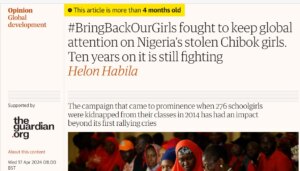
Ten Years After Chibok Girls’ Abduction
This year marks ten years since over 200 girls were abducted by Boko Haram insurgents in North-East Nigeria. The media coverage of the event created an opportunity to investigate the postcolonial context of the media coverage of Africa in my just concluded PhD study. I was inspired to carry out this study after I was interviewed by an international news organisation when the girls were abducted in April 2014. The experience roused a curiosity into how the media covers Africa in terms the voices that are sought to speak on issues regarding the continent.

The research was set to compare the media coverage of the abduction in both the domestic and international media. Findings revealed that the problem of African media coverage is not exclusive to international/foreign media but the Nigerian media also omitted important context in their coverage of the incident. Nigeria is a multicultural, multifaceted, country which has layered history and enough inhabitants to be the most populous country in Africa. These peculiarities can be traced back to Nigeria’s colonial history and the activities of the abductors of the girls is as a result of some of this history.
Boko Haram, an insurgency group that sprung up in response to colonial activities in Nigeria, took responsibility for the abduction of the girls. The stance of Boko Haram was that they were against western education and rejected western ideologies. Many studies have identified the negative, stereotypical and simplistic coverage of African issues and that is valid. However, there is an important postcolonial context that is missing in the narrative in not just the international media but the local media alike.
The ‘post’ in postcolonial is usually one that is often challenged. Is colonialism over or has it just taken another form. I agree with the scholars that define it as simply an acknowledgement of the historical timestamp of when countries were under direct or obvious colonial rule. The colonial influence now takes the more ‘subtle’ shape of neo-colonialism and there is not enough acknowledgement of the practical ways these impacts the colonised.
The activities of Boko Haram are questionable and their abduction of the Chibok girls was even more so. However, if we fail to lay credence to what is responsible for these problems then we turn a blind eye to possible ways of finding solutions to it. If the media attributes the activities of Boko Haram to senseless violence and not acknowledge the fact that they are a people with misplaced anger and wrongly channelled grievances, then we continue to promote harmful stereotypes that does not help anyone.
I am open to collaborating with scholars to investigate the postcolonial context of issues in other ‘former’ colonies. I think it is important to understand this nuances and start including them in news reports across board.
